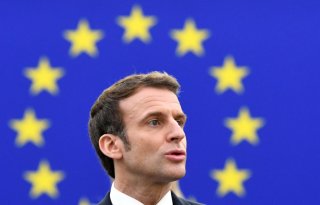Will Europe Become a True Digital Power?
By solving outstanding issues like data flows and by shaping the Trade and Technology Council into a functional and effective forum for cooperation, the transatlantic relationship can become even stronger in 2022.
In Prague, which will hold the EU presidency in the second half of 2022, discussions of digital policy focus much less on sovereignty and more on completing the Digital Single Market, encouraging investment, and ensuring Europe’s competitiveness. However, as a small country that still ranks on the lower half of the European Commission’s Digital Economy and Society Index (but only slightly below France), Czechia is keen to remove barriers that remain within the EU market and to secure the money, skills, and infrastructure needed to become a digital success. For the Czechs, sovereignty—including digital sovereignty—requires a strong economy, and this requires innovation and investment. As then-Czech deputy minister of industry and trade Petr Očko said in an Atlantic Council session, “In Europe, we sometimes have a tendency to overregulate.” On artificial intelligence, he noted that “we need regulation in this key area but need it to be less heavy.” Assuming the French do bring the DMA, and potentially the DSA, over the finish line, the priorities for the Czechs will be advancing the already-proposed AI Act and the soon-to-be-introduced Data Act.
This year will be a litmus test for Europe’s transition from super-regulator to global digital player and for its appetite for keeping digital policy transatlantic. The next twelve months will show if U.S.-EU talks on trade and tech will reshape transatlantic cooperation or fizzle out. And securing a new foundation for transatlantic data flows will have significant implications for the digital economy.
For U.S. policymakers, a more powerful Europe in the digital space could be either a headache or the beginnings of a partnership. They would be wise to recognize Europe’s burgeoning role as an opportunity to jointly face challenges from digital authoritarians like China. For its part, European policymakers would do well to reaffirm the value of open markets and to moderate the protectionist instincts of the more vocal proponents of digital sovereignty. By solving outstanding issues like data flows and by shaping the TTC into a functional and effective forum for cooperation, the transatlantic relationship can become even stronger in 2022.
Frances G. Burwell is a distinguished fellow at the Atlantic Council and a senior director at McLarty Associates.
Kenneth Propp is a nonresident senior fellow in the Atlantic Council’s Europe Center and teaches European Union law at Georgetown University Law Center.
Morten Skroejer is a Nonresident Senior Fellow at the Atlantic Council and former counselor to Denmark’s ambassador to the United States.
Image: Reuters.

